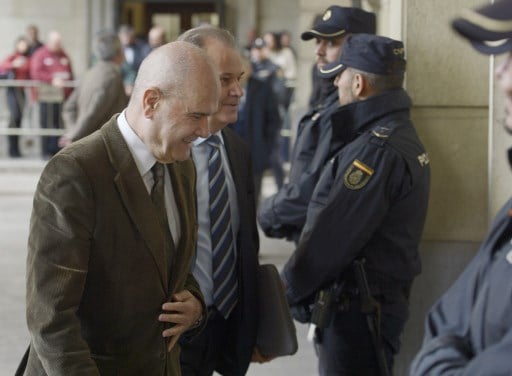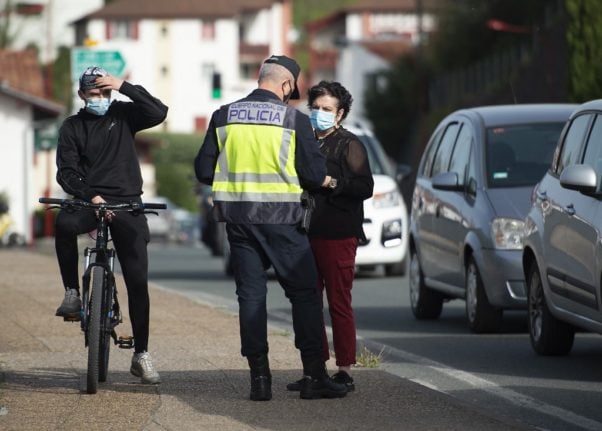What’s Caso ERE?
The 19 were convicted by a Seville court of distributing, without due diligence, hundreds of millions of euros meant to help the unemployed and companies in difficulty in the region of Andalusia.
It became known as the ERE case after the Spanish acronym for a mass-layoff plan (expediente de regulación de empleo, or ERE).
Prosecutors estimated that, over a decade, members of the Andalusian administration diverted 680 million euros ($752 million) in public funds.
They say it was discreetly passed on to people and businesses, often with close ties to the Socialist party, some of whom were not affected by layoffs — which the funds were intended to compensate.
The court said there was an “absolute lack of control” in the management of the funds.
How high up does the scandal go?

Former Socialist presidents of the Junta de Andalucia Manuel Chaves (4thR) and Jose Antonio Grinan (3rdR) appear before a judge at the Seville courthouse at the start of the trial in 2017. Photo: AFP
Two former heads of Andalusia's regional government, Manuel Chaves and Jose Antonio Grinan, were among those convicted. Both men also served as ministers under former Socialist prime minister Felipe Gonzalez.
The court found Grinan guilty of embezzlement and misappropriation of public funds and sentenced him to jail for six years. He was also declared ineligible for public office for 15 years.
It found Chaves guilty of maladministration and declared him ineligible for public office for nine years
The former government minister and ex-regional economic chief Magdalena Álvarez, as well as another former regional minister, Gaspar Zarrías, have also been barred from public office for nine years.
Another four ex-regional ministers have been given prison terms: Antonio Fernández and José Antonio Viera (Employment), Francisco Vallejo (Innovation) and Carmen Martínez-Aguayo (Economy).
A total of nineteen others were found guilty of various crimes related to the fraud and two other people who stood trial were acquitted.
Hasn’t this been going on for ages?
As we know in Spain, the wheels of justice turn slowly.
The trial itself got underway in December 2017 and lasted a year, but it was in the news long before that. .
The scandal broke in 2010, at the height of Spain's financial crisis, as Socialist prime minister Jose Luis Zapatero was introducing a slew of austerity measures that included cuts to civil servants' wages.
The affair forced Grinan to resign as head of the regional government of Andalusia.
The investigation itself dragged on for nine years with 507 people under scrutiny by a series of seven investigating judges.
Eventually the case was became so unmanageable that it was divided into 146 separate probes.
The verdict issued on Tuesday relates to just one of those probes and the court ruling reaches to 1,700 pages rivalling that of the Gürtel case which involved Spain’s conservative Popular Party and more than three times more than the ruling issued by the Supreme Court on the trial of Catalan separatist leaders.
Why does it matter?

Sanchez ousted Mariano Rajoy after the PP became embroiled in a corrruption scandal. But is the PSOE any better? Photo: AFP
The ruling comes as Prime Minister Pedro Sanchez struggles to secure enough support from other parties to be sworn in for another term.
His Socialist Party won a repeat general election on November 10th, but once again fell short of an absolute majority in parliament and the judgement could complicate his talks with other parties.
The conviction of two high-profile Socialists will provide fresh ammunition for Spain's main opposition Popular Party (PP) against the Socialists' current leader Sanchez, who seized power from Rajoy as the conservative party foundered in the wake of a corruption scandal within their own party.
“If he does not assume political responsibility today for the theft of money destined for the unemployed in Andalusia, Mr.Sanchez is disqualified to be the head of the government,” PP general secretary Teodoro Garcia Egea told a news conference.
The PP argues the ERE case shows the Socialists resorted to cronyism, using taxpayers' money to reward supporters with jobs and benefits in a bid to maintain their decades-long grip on the region.
Criticism of the Socialists also came from the left.
“The sentence confirms that for years, Socialist leaders in Andalusia used public money to support a mafia network that bought social peace and fed corruption,” said Alberto Garzon, the leader of Izquierda Unida, or United Left.
Andalusia, Spain's most populous region, had been for decades a stronghold of the Socialists but the PSOE lost control of the Andalusia regional government in January after 36 years in office, to a coalition of the PP and the market-friendly Ciudadanos.
That same election saw the electoral breakthrough of the far-right party Vox, which won its first seats.
Spain has seen repeated corruption scandals in recent years that have exposed politicians, trade unions, bankers, footballers and even members of the royal family.
The string of revelations have eroded Spaniards' faith in their institutions and elites. Polls show corruption is a major concern for Spaniards.
READ MORE: Spain's Socialists and Podemos make pack to form new government



 Please whitelist us to continue reading.
Please whitelist us to continue reading.
Member comments